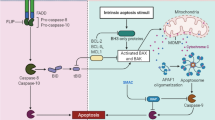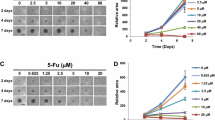Abstract
Resveratrol is a naturally occurring polyphenolic compound highly enriched in grapes, peanuts, red wine, and a variety of food sources. Sulforaphane belongs to the family of isothiocyanates and is highly enriched in cruciferous vegetables. Our previous study showed that resveratrol, when used at high concentrations, inhibited cell proliferation, caused the cell cycle arrest and induced apoptotic cell death in glioma cells. In the current study, we tested the effect of combination treatment with resveratrol and sulforaphane, when both were used at low concentrations, on cell proliferation, migration and death in human U251 glioma cells. Our study shows that combination treatment with resveratrol and sulforaphane inhibits cell proliferation and migration, reduces cell viability, induces lactate dehydrogenase release, decreases pro-survival Akt phosphorylation and increases caspase-3 activation. The use of combination of bioactive food components, such as resveratrol and sulforaphane, may be a viable approach for the treatment of glioma.






Similar content being viewed by others
References
Koul D, Shen R, Bergh S et al (2006) Inhibition of Akt survival pathway by a small-molecule inhibitor in human glioblastoma. Mol Cancer Ther 5:637–644
Boiardi A, Silvani A, Milanesi I et al (1991) Primary glial tumor patients treated by combining cis-platin and etoposide. J Neurooncol 11:165–170
Kondo Y, Hollingsworth EF, Kondo S (2004) Molecular targeting for malignant gliomas (Review). Int J Oncol 24:1101–1109
Lambert JD, Hong J, Yang GY et al (2005) Inhibition of carcinogenesis by polyphenols: evidence from laboratory investigations. Am J Clin Nutr 81:284S–291S
Harikumar KB, Aggarwal BB (2008) Resveratrol: a multitargeted agent for age-associated chronic diseases. Cell Cycle 7:1020–1035
Delmas D, Lancon A, Colin D et al (2006) Resveratrol as a chemopreventive agent: a promising molecule for fighting cancer. Curr Drug Targets 7:423–442
Kundu JK, Surh YJ (2008) Cancer chemopreventive and therapeutic potential of resveratrol: mechanistic perspectives. Cancer Lett 269:243–261
Tseng SH, Lin SM, Chen JC et al (2004) Resveratrol suppresses the angiogenesis and tumor growth of gliomas in rats. Clin Cancer Res 10:2190–2202
Zhang Y, Talalay P, Cho CG et al (1992) A major inducer of anticarcinogenic protective enzymes from broccoli: isolation and elucidation of structure. Proc Natl Acad Sci USA 89:2399–2403
Matusheski NV, Jeffery EH (2001) Comparison of the bioactivity of two glucoraphanin hydrolysis products found in broccoli, sulforaphane and sulforaphane nitrile. J Agric Food Chem 49:5743–5749
Myzak MC, Ho E, Dashwood RH (2006) Dietary agents as histone deacetylase inhibitors. Mol Carcinog 45:443–446
Fimognari C, Hrelia P (2007) Sulforaphane as a promising molecule for fighting cancer. Mutat Res 635:90–104
Karmakar S, Banik NL, Patel SJ et al (2006) Curcumin activated both receptor-mediated and mitochondria-mediated proteolytic pathways for apoptosis in human glioblastoma T98G cells. Neurosci Lett 407:53–58
Jiang H, Zhang L, Kuo J et al (2005) Resveratrol-induced apoptotic death in human U251 glioma cells. Mol Cancer Ther 4:554–561
Jiang H, Movsesyan V, Fink DW Jr et al (1997) Expression of human p140trk receptors in p140trk-deficient, PC12/endothelial cells results in nerve growth factor-induced signal transduction and DNA synthesis. J Cell Biochem 66:229–244
Everitt AV, Hilmer SN, Brand-Miller JC et al (2006) Dietary approaches that delay age-related diseases. Clin Interv Aging 1:11–31
Willett WC (1995) Diet, nutrition, and avoidable cancer. Environ Health Perspect 103(Suppl 8):165–170
Aggarwal BB, Shishodia S (2006) Molecular targets of dietary agents for prevention and therapy of cancer. Biochem Pharmacol 71:1397–1421
Shimizu M, Shirakami Y, Sakai H et al (2007) EGCG inhibits activation of the insulin-like growth factor (IGF)/IGF-1 receptor axis in human hepatocellular carcinoma cells. Cancer Lett 262:10–18
Simon HU, Haj-Yehia A, Levi-Schaffer F (2000) Role of reactive oxygen species (ROS) in apoptosis induction. Apoptosis 5:415–418
Aziz MH, Kumar R, Ahmad N (2003) Cancer chemoprevention by resveratrol: in vitro and in vivo studies and the underlying mechanisms (review). Int J Oncol 23:17–28
Morris GZ, Williams RL, Elliott MS et al (2002) Resveratrol induces apoptosis in LNCaP cells and requires hydroxyl groups to decrease viability in LNCaP and DU 145 cells. Prostate 52:319–329
Lin HY, Shih A, Davis FB et al (2002) Resveratrol induced serine phosphorylation of p53 causes apoptosis in a mutant p53 prostate cancer cell line. J Urol 168:748–755
Joe AK, Liu H, Suzui M et al (2002) Resveratrol induces growth inhibition, S-phase arrest, apoptosis, and changes in biomarker expression in several human cancer cell lines. Clin Cancer Res 8:893–903
Park JW, Choi YJ, Suh SI et al (2001) Bcl-2 overexpression attenuates resveratrol-induced apoptosis in U937 cells by inhibition of caspase-3 activity. Carcinogenesis 22:1633–1639
Mouria M, Gukovskaya AS, Jung Y et al (2002) Food-derived polyphenols inhibit pancreatic cancer growth through mitochondrial cytochrome C release and apoptosis. Int J Cancer 98:761–769
Gao X, Xu YX, Divine G et al (2002) Disparate in vitro and in vivo antileukemic effects of resveratrol, a natural polyphenolic compound found in grapes. J Nutr 132:2076–2081
Wolter F, Akoglu B, Clausnitzer A et al (2001) Downregulation of the cyclin D1/Cdk4 complex occurs during resveratrol-induced cell cycle arrest in colon cancer cell lines. J Nutr 131:2197–2203
Zhang W, Fei Z, Zhen HN et al (2006) Resveratrol inhibits cell growth and induces apoptosis of rat C6 glioma cells. J Neurooncol 81:231–240
Bertl E, Bartsch H, Gerhauser C (2006) Inhibition of angiogenesis and endothelial cell functions are novel sulforaphane-mediated mechanisms in chemoprevention. Mol Cancer Ther 5:575–585
Weisburger JH (1999) Carcinogenicity and mutagenicity testing, then and now. Mutat Res 437:105–112
Choi WY, Choi BT, Lee WH, Choi YH (2008) Sulforaphane generates reactive oxygen species leading to mitochondrial perturbation for apoptosis in human leukemia U937 cells. Biomed Pharmacother
Park SY, Kim GY, Bae SJ et al (2007) Induction of apoptosis by isothiocyanate sulforaphane in human cervical carcinoma HeLa and hepatocarcinoma HepG2 cells through activation of caspase-3. Oncol Rep 18:181–187
Pledgie-Tracy A, Sobolewski MD, Davidson NE (2007) Sulforaphane induces cell type-specific apoptosis in human breast cancer cell lines. Mol Cancer Ther 6:1013–1021
Choi S, Singh SV (2005) Bax and Bak are required for apoptosis induction by sulforaphane, a cruciferous vegetable-derived cancer chemopreventive agent. Cancer Res 65:2035–2043
Kim BR, Hu R, Keum YS et al (2003) Effects of glutathione on antioxidant response element-mediated gene expression and apoptosis elicited by sulforaphane. Cancer Res 63:7520–7525
Sexton E, Van Themsche C, LeBlanc K et al (2006) Resveratrol interferes with AKT activity and triggers apoptosis in human uterine cancer cells. Mol Cancer 5:45
Aziz MH, Nihal M, Fu VX et al (2006) Resveratrol-caused apoptosis of human prostate carcinoma LNCaP cells is mediated via modulation of phosphatidylinositol 3′-kinase/Akt pathway and Bcl-2 family proteins. Mol Cancer Ther 5:1335–1341
Chaudhuri D, Orsulic S, Ashok BT (2007) Antiproliferative activity of sulforaphane in Akt-overexpressing ovarian cancer cells. Mol Cancer Ther 6:334–345
Jin CY, Moon DO, Lee JD et al (2007) Sulforaphane sensitizes tumor necrosis factor-related apoptosis-inducing ligand-mediated apoptosis through downregulation of ERK and Akt in lung adenocarcinoma A549 cells. Carcinogenesis 28:1058–1066
Acknowledgment
The study is supported in part by NIH grant R21 AT003463-01A2.
Author information
Authors and Affiliations
Corresponding author
Rights and permissions
About this article
Cite this article
Jiang, H., Shang, X., Wu, H. et al. Combination Treatment with Resveratrol and Sulforaphane Induces Apoptosis in Human U251 Glioma Cells. Neurochem Res 35, 152–161 (2010). https://doi.org/10.1007/s11064-009-0040-7
Received:
Accepted:
Published:
Issue Date:
DOI: https://doi.org/10.1007/s11064-009-0040-7




